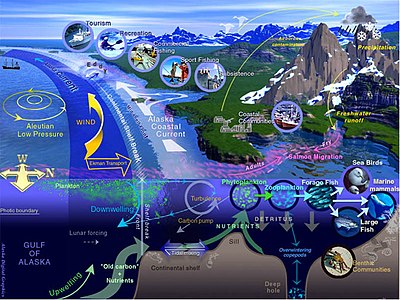
schematic of Alaskan ecosystems, natural and social (credit: Wikipedia)
A review of a key point would be useful today.
In the moral realist worldview, a community, a society, or a nation - all these are ecosystems. They contain many different sub-groups, sub-sub-groups and even individuals that have clearly differing beliefs, values, habits, mores, personal rituals, and so on. These various "species" act and interact and sometimes cooperate in a mutalistic way and sometimes compete in predator-prey relationships and sometimes even live in parasite-host relationships. But all the relationships link together to form a system that is tremendously complex.
Each living individual in a social ecosystem is driven by memes (concepts, beliefs, and other purely mental programs) far more than by genes. These meme/concepts/beliefs are mostly learned from each individual human's parents and teachers during her/his developing years. To complicate matters, human individuals are highly capable of altering at least some of these memes. This makes humans much more programmable and nimble than say gene-driven species in jungle,wilderness, or ocean environments. People can learn new skills, new jobs, new languages, customs, manners, ways of grooming and dressing themselves, and so on, and in fact some people in nearly every culture are doing these kinds of things all the time.
Therefore, we should not be surprised at all by the fact that any vigorous community or nation always contains a lot of different kinds of people, interacting, cooperating, and competing all the time.
In this model of cultural evolution, an ecosystem that contains a lot of behaviorally and mentally diverse species, rather than anatomically/genetically different species, will be far more resilient and able to adapt to surprise shocks and stresses than any ecosytem made of only a few relationships between a limited number of species.
This is why, in this hazardous, uncertain universe, pluralistic democracy has kept growing and spreading, gradually and slowly, for millenia. It gets stronger not because it's nice but because it works. It gets results. Hard, observable, measurable results. The results just take time.
Pluralistic democracy celebrates diversity, by letting neighbors differ from each other in any ways that do not damage the peace. Thus, when a shock hits the nation, there are better odds that the nation will contain someone who can see how to handle it and then teach his method to his neighbors. Better odds in a democracy than a more homogeneous, totalitarian system can ever contain.
We need differences. They make us strong. (This is what Hilary Clinton, just a few months ago, was trying to say.) The intra-national tensions and debates these differences set off can feel threatening and upsetting in the short term. But in the long term, these debates are sure signs that the nation is staying strong.
Look back over the real histories of the democracies of the world. They always seemed, to their critics - to be on the brink of flying apart. Yet here they are, more numerous and prolific by the decade all over the world. In the meantime, totalitarian states by the dozens have become footnotes in the history books.
It was Churchill, a conservative if ever there was one, who said: "Democracy is the worst form of government ...except for all the others." Though I disagree diametrically with much of what he said and did in the course of his life, and admire much as well, in the quote above he was spot on.
And that's enough for today. In the shadow of the mushroom cloud, nevertheless, have a nice day anyway.

Little Italy, New York City, circa 1900 (credit: Wikipedia)

Chinatown, New York City, 2009 (credit: Wikipedia)
No comments:
Post a Comment
What are your thoughts now? Comment and I will reply. I promise.